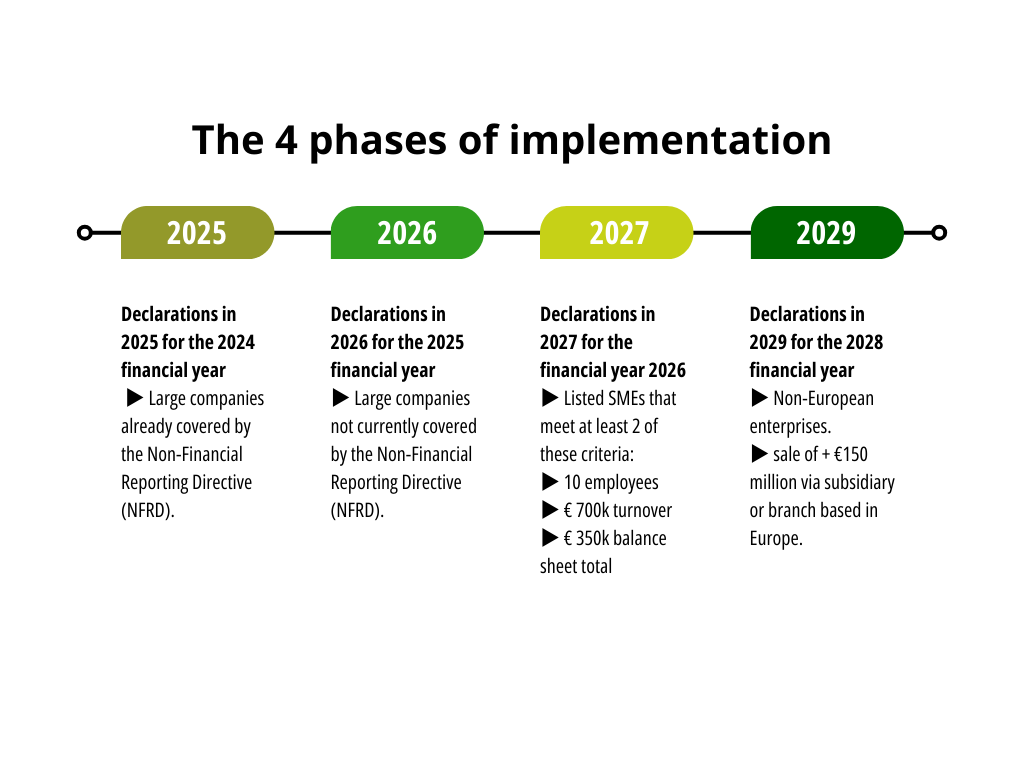Corporate Sustainability Reporting Directive (CSRD): what is it and what do I need to do?
Since January 2023, the European Corporate Sustainability Reporting Directive (CSRD) requires certain companies to report annually and transparently on their sustainability management and results. Environmental coordinator Matthieu Legros explains what this means for your organisation.

Please note: the European Union has put forward a proposal to simplify CSRD reporting. This Omnibus law is currently being discussed by the European Parliament, which must approve it.
The main changes would be that the reporting obligation would only apply to large companies employing more than 1,000 people and with a turnover of €50 million, or a balance sheet value of €25 million. In practice, the scope of the CRSD will be reduced by around 80%. The double materiality rule will continue to apply.
As soon as this adjustment is official, you will read about it here.
The CSRD directive is an extension of the existing Non-Financial Reporting Directive (NFRD).
The goal? Supporting companies in the transition towards a more sustainable economy and contributing to the goal of being a climate-neutral continent by 2050.
The CSRD directive makes it mandatory for European companies to chart their relevant ESG performance (‘Environment, Social, Governance’). For example:
- How much energy and water does the company consume?
- Does the organisation offer a diverse work environment?
- What is the ratio between men and women in the management team?
- Is there a code of conduct which must be respected by employees and suppliers?
- ...
In a sustainability report you define the impact of your organisation on the outside world (inside-out), and the impact that the outside world has on the organisation (outside-in).
This is known as double materiality and helps you to assess both the risks and the opportunities.
In addition, each organisation concerned must demonstrate its vision and report on the resources relating to the activities: what are the ESG goals for 2025, 2030, or 2050 and how will you achieve them? How are you preparing for the climate-neutral economy of the future?
How do you get started?
- The first step is to identify the thematic priorities for your organisation using a double materiality analysis. You look at the impact your organisation has on the outside world and vice versa.
This is done for all topics considered to be ‘material’, in other words, those that have a big impact on the organisation in terms of finances, sustainability and social responsibility. Furthermore, you do this for the entire value chain, which means including the impact of your clients and suppliers. - Then, it is important to compare the present management and communication measures with the requirements in the CSRD. What are you already doing? What is expected of you? What is still missing?
- This information forms the foundation of an action plan that sets priorities for your organisation.
- For each topic requiring action, clear goals and KPIs are defined.
- Finally, the KPIs must be tracked.
The sustainability report is inspected by an external auditor and is also accessible to the public, allowing employees, suppliers, investors and other stakeholders to be informed about the sustainability of and in your organisation.
Mensura can guide you through all these steps and help you make these intensive obligations a true advantage for your organisation.
For whom?
The directive does not apply to all companies and will also be implemented in phases. Below is an overview of which companies must meet the requirements in which phase.

As from the reference year 2024 (reporting in 2025):
- large European and non-European companies meeting NFRD thresholds
- with more than 500 employees
- with a turnover of more than € 40 million
- and/or more than €20 million on the balance sheet
As from reference year 2025 (reporting in 2026):
- European companies that meet at least 2 of these criteria;
- more than 250 employees
- with a turnover of € 50 million
- and/or more than € 25 million in total assets
As from reference year 2027 (reporting in 2028):
- listed SMEs that meet at least 2 of these criteria;
- 10 employees
- 700,000 € turnover
- 350,000 € balance sheet total
As from reference year 2028 (reporting in 2029):
- non-European enterprises
- sales of more than € 150 million via a subsidiary or branch based in Europe
Most companies are already preparing for the report by gathering the required information. Even if your organisation is not (yet) obliged to satisfy the CSRD directive, it is still worth charting your sustainability activities, given the growing importance of this topic for clients and other stakeholders. Furthermore, in certain cases, third parties (e.g. suppliers and/or clients) are required to satisfy the CSRD directive, which means you must give them the information.
How can Mensura help?
Is your organisation obliged to meet the CSRD directive? Or are you keen to get started with your sustainability goals? Our environment experts are very happy to help you:
- Conduct an environment screening
- Appoint a sustainability team and determine different goals aligned with legislation
- Get support in sustainability reporting
- …
Contact us using the form below.